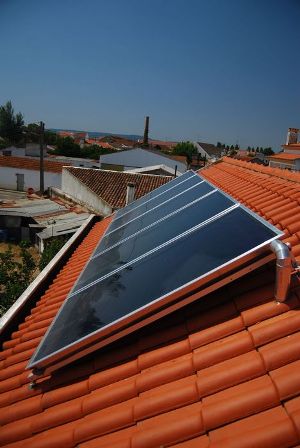

Portuguese 2020 target for solar thermal: Faraway, so close to deadline
It’s just like in the Wim Wenders movie: Each year, the Portuguese goal for solar thermal energy seems more faraway, so close to the deadline. The country, which aims at a target of 2,214,282 million m² of installed area in 2020, saw a mere 1,080,317 m² set up until the end of 2014. In 2014, only 54,961 m² were added, 4 % less than in the previous year. This year, market stakeholders expect stagnation, although figures for the first six months pointed downward. An area of 21,852 m² was newly installed during the first half of 2015, which is a decrease of 18 % compared to the same period last year.
Photo: Sotecnisol / Apisolar
Looking at market segmentation, residential housing continues to have the largest influence by having accounted for 63 % of total market volume in the first half of 2015 (67 % for all of 2014). Despite the expectations for commercial, non-residential buildings created by the solar thermal obligation, which went into force in early 2014 and also applies to this type of building (newbuilds), the share of commercial premises is still low, constituting only 37 % of sales (33 % throughout all of 2014).
Three factors harm business
Despite these results, Victor Júlio, Vice President Solar Thermal at the national solar industry association APISOLAR, tries to avoid painting too much of a negative picture. “We do not have a lack of market potential, because Portugal has about 3.5 million homes and an estimated 300,000 have solar thermal systems, which is less than 10 % of the market,” he says. The state that the Portuguese market is in right now is a result of “a combination of different factors”. Although none of these negative developments is “dramatic on its own”, their accumulation hardly helps business.
- First: There is rarely any new construction. “Solar thermal is mandatory for new buildings, but over the first six months, only 4,000 houses were built in Portugal,” Júlio explains.
- Second: There is a certain market saturation regarding existing building stock. “Since 2008, we have been selling solar systems to owners of existing building stock. It is normal that after so many years with the same dynamic, there will be a decrease in the number of families who tend to look for this solution,” Júlio explains. The slowdown is exacerbated by the difficult economic situation with which Portuguese families are faced and which is hindering new investment.
- Third: No current incentives for solar thermal technology. “The country should not spend what we do not have, but we need to find ways to guide whatever there is, so that people can see that there is an incentive to invest in solar,” Apisolar’s vice president proposes.
Upgrade support for existing systems is inadequate
Since the EUR 95 million incentive scheme (Medida Solar Térmico 2009), which had led to the exponential growth of the Portuguese market and whose stimulus effects were felt until 2011, solar thermal incentives have become increasingly scarce across the country. In late 2012, the Energy Efficiency Fund (EEF) launched the Efficient Building Call, which made EUR 1 million available to support the installation of solar thermal in existing buildings. Already this year the EEF has started a new call with a budget of EUR 500,000 supporting the renovation of existing solar thermal systems installed before December 2005. In the eyes of APISOLAR, it was an inadequate measure and should have had little impact on the market, because “the old installations are not as old, nor as many to justify such a subsidy scheme”.
Marketing campaign on solar benefits
The assessment of solar thermal by the previous conservative government has apparently been favourable. “Solar heating has been generally seen as a technology to be supported, but in practical terms, this has so far not become reality,” says Júlio. The new government has not yet been established because of the elections at the beginning of October. With the 2020 deadline getting closer, the expert warns that with “each passing year, the goal will be more difficult to achieve.”
Although Júlio believes that the Portuguese have already been aware of solar thermal’s efficiency and ability to grant a certain energy independence, he underlines the importance of not letting these advantages be forgotten. That said, the expert looks beyond a financial incentive, which would unquestionably be positive for the market, to emphasise the need for a “communication and mobilisation plan on the benefits of solar energy” – which usually should be managed by government authorities, but in reality is being left to the engagement of commercial companies only, he regrets.
More information:
Further information about the 2015 replacement scheme